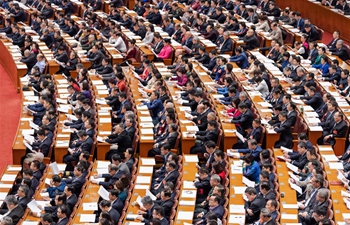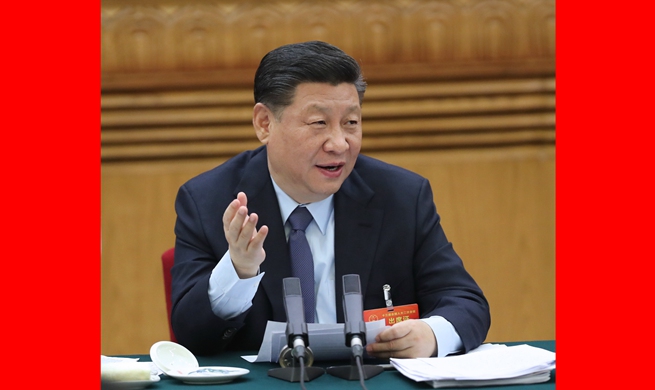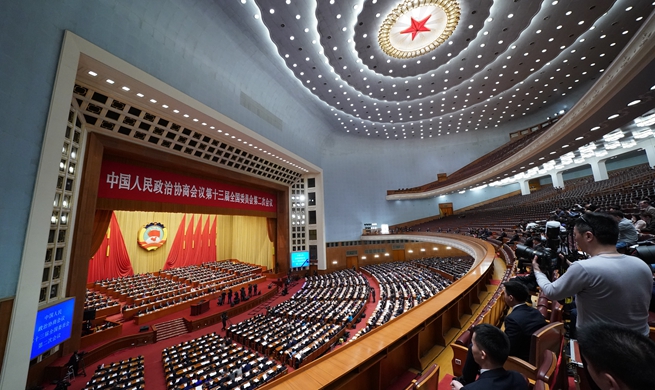BEIJING, March 11 (Xinhua) -- As usual, Zeng Quande's birthday party this year was full of foreign flavors, such as German beer, Russian wine and Belgium candy. The white-collar worker in southwest China's Chongqing municipality had bought them at a local exhibition and trade center for bonded commodities.
"Our generation has become accustomed to buying foreign products. The center is convenient for consumers," said Zeng, a bank clerk. The center Zeng visits frequently has 35,000 types of commodities imported from 40 countries and regions, through China-Europe container trains, ships and other means.
After 40 years of reform and opening up, for Chinese citizens like Zeng, it is no longer a luxury to purchase foreign-brand food, wine, cosmetics, and smartphones, owing to booming e-commerce, fast logistics, more imports and growing income.
Consumer spending contributed 76.2 percent to China's GDP growth last year, making it the largest driver of the country's economic growth for six years in a row. And the trend is expected to continue with a slew of support measures ranging from individual income tax cuts to developing elderly and child care sectors, and to preferential policies on the purchase of new-energy vehicles.
The country will use a combination of measures to increase urban and rural personal incomes, boost capacity for consumption and use multiple avenues to increase the supply of quality products and services, according to the government work report delivered to the annual session of the National People's Congress, China's top legislature, on March 5.
In February, Danish toy giant Lego opened a flagship outlet in Beijing's Wangfujing shopping area, its third such store on the Chinese mainland. The Chinese market registered strong double-digit revenue growth in 2018 as the firm expanded business in more cities and on e-commerce, as well as digital and physical platforms.
"China is creating new models to make consumption more convenient and meet the diversified demands of consumers," said Zhao Ping from the research department of the China Council for the Promotion of International Trade.
To stimulate consumption of goods and services, big cities like Beijing and Shanghai have rolled out plans and policies to expand and upgrade commerce facilities, such as building more suburban boutique hotels and shopping malls, and hosting domestic and international expos.
Beijing will upgrade key shopping streets such as Wangfujing, boost fashion consumption and encourage the debut of global products in the city.
The city also plans to construct shopping centers near airports, and promote winter sports consumption along with the hosting of the 2022 Winter Olympics, according to the city's development and reform commission.
Shanghai will also build novel and world-class shopping streets and make the city a favorite choice for consumers to buy products from high-end brands, according to the business hub's action plan for boosting consumption from 2018 to 2020.
"With a domestic market and a population of nearly 1.4 billion, China has incomparable advantages in economic growth," said Chen Lifen, a researcher with the Ministry of Commerce.
Last year, retail sales, a main gauge of consumption, rose 9 percent from one year earlier, down from 10.2 percent in 2017. But sales of many kinds of quality products increased remarkably, a clear sign of consumption upgrade.
For example, China's imports of cosmetic products and aquatic products increased by 67.5 percent and 39.9 percent respectively last year, according to customs data.
The volume of China's household electric appliances reached 810.4 billion yuan (about 120.6 billion U.S. dollars) in 2018, a year-on-year increase of 1.9 percent, according to a report jointly released by the China Household Electric Appliance Research Institute and the National Household Appliance Industry Information Center.
Despite the slight growth, Chinese consumers show a growing demand for high-end home appliances. For instance, the retail sales share of smart washing machines expanded to 39.8 percent last year, according to the National Household Appliance Industry Information Center.
Consumption and industrial upgrades have become the new driver of growth in the home appliance sector, said Song Jingxue, head of the research department of the center.
Last year, China's per capita disposable personal income grew by 6.5 percent in real terms. The threshold for individual income tax was raised and six special additional deductions created, including for child education and treatment for serious diseases. This benefits approximately 80 million taxpayers.
Among this year's main projected targets, the government aims to create over 11 million new urban jobs and ensure personal income growth is basically in step with economic growth. The government will adopt an employment-first policy this year.
Job fairs for college graduates and migrant workers have been held in different places in the past two weeks.
"A lot of jobs are offered, but some posts demand work experience. So there are both opportunities and challenges," said Ji Yongxiang, a graduate in accounting from Hebei Agricultural University at a job fair in Cangzhou, a coastal city of Hebei Province.
















